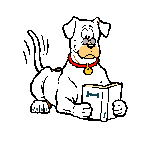 |
Canine Learning Center, Inc. |
| Chewing |
 |
Canine Learning Center, Inc. |
| Chewing |
by Leah Spitzer
Chewing is a natural act for your dog.
If he lived in the wild, his
behavior would be acceptable. He
will not grow out of it on his own; he must be re-directed.
Your job as the owner is to teach him how to live in our world.
Your job is to teach him what he can chew and what he can’t chew.
Your job is to keep him safe.
Chewing the wrong item can be hazardous to your dog.
Puppies will try almost anything once:
electrical cords, chicken bones, glass (yes!), remote controls, socks,
soda cans…the list is endless. The
following method works well with my
students. The following
method will keep your dog safe.
Don’t
chase him down or reprimand him. This
teaches him to run away. This
teaches him NOT TO COME. He may
also chomp down harder as he running.
You want your dog to trust you.
This is a safety issue. You
want to be able to take anything out of his mouth at any time.
You want your dog to bring you anything he puts in his mouth. When he understands it is to his advantage to show you
everything, your shoes will be
delivered to you, not destroyed.
Somewhere around 9 - 10 months of age,
he will no longer pick up what doesn’t belong to him.
My first golden retriever, Gabriel, put
everything in his mouth. I mean
everything. I did what the books told me to do.
I firmly shouted “no”, chased him down and corrected him harshly.
Gabriel learned to grab and run. Gabriel
destroyed shoes, stuffed animals and clothing.
Somewhere around 9-10 months of age,
Gabriel stopped the destruction. However,
it then took me a long time to re-teach Gabriel to come as well as to allow me
to take things out of his mouth. I
knew there had to be a better way.
I raised my next dog, Arrow, quite differently. First, I prepared the house. I bought lots of toys and hid them all over the house. I hid them under couch cushions, on shelves, wherever I could. Whenever Arrow put something in his mouth that didn’t belong to him, I would very pleasantly, in my best puppy voice, say, “Arrow, what do you have?” Arrow would dance around very proudly showing me his treasure. “Arrow, let me seeee!!!!” Arrow would bring me his prize to show me. When Arrow brought me the “prize”, I would thank him profusely, reach for one of the hidden toys and trade. Arrow took to this game with vigor. Arrow did go a little more overboard than most puppies. He brought me anything he could carry to see what I would trade it for, including the cat food dish with the cat food still in it!
Somewhere around 9-10 months of age,
Arrow grew out of it. I didn’t lose a single shoe, stuffed toy, or
pillow and Arrow stayed safe.
Last year I bought my first
German Shepherd puppy. I
hoped this method would work on a non-retrieving breed.
Not only did it work, but it paid off the day “Lacey” brought me a
light bulb she had pulled out of the waste basket!
If Lacey had run away and clamped down…
well, I don’t want to think about it!
Notes:
If they won’t bring it to you,
gently walk over to them, grabbing a hidden item on the way,
and play the same game. Trade
out and thank them.
Immovable objects: Bitter
Apple is still my first choice. I
automatically treat all electrical cords, table legs, etc. with Bitter Apple. If
your puppy still insists on chewing an immovable object, I gently approach him,
and trade out.
If they do it when you are not looking: Take a rolled up newspaper and while hitting YOURSELF on the
head, repeat 3 times, “I forgot to watch my dog, I forgot to watch my dog, I
forgot to watch my dog”. You
would never think of leaving 2 year old child unattended. Do not leave a puppy unattended!
If you can’t watch a toddler, you put him in his playpen.
If you can’t watch your puppy, put
him in his crate.
Resist the temptation to be more “aggressive” in
your response. It might be your
favorite pair of shoes, but programming your puppy to be safe is more important.
Creating a dog that runs away in fear of punishment is not only
frustrating, it’s dangerous! Personally,
I would rather risk replacing my shoes than my puppy.
ÓReprint
only with permission of author